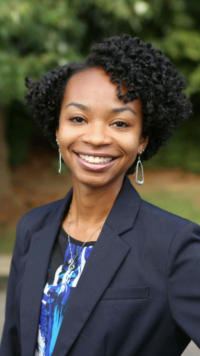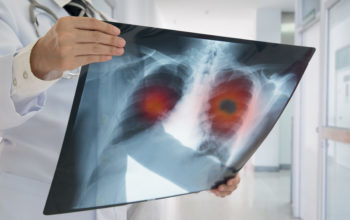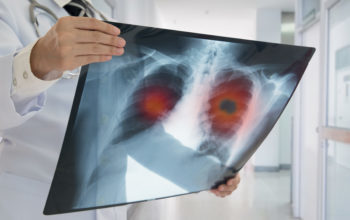By Rochelle Smalls and Dr. Daniel Miller
Lung cancer is called the “silent killer” because it is the leading cause of cancer-related deaths and is often diagnosed in its later stages. It is generally associated with cigarette smoking, though it can be caused by pollutants in the air.
Additionally, lung cancer has an especially large impact on communities of color, which is why we must work together to end social and health inequalities contributing to disparities in cancer screening, diagnosis, treatment and research.
While health disparities in communities of color are being discussed much more frequently amid the COVID-19 pandemic, they are not new. Lung cancer adversely affects certain communities partly due to a history of targeted advertisement by tobacco companies, a disproportionate number of people of color living in areas with poor air quality, and some minorities’ limited access to high-quality, affordable health care.

Lung cancer disparities in communities of color are unfortunately very prominent across the country and in Georgia. Blacks, Latinos and Native Americans diagnosed with lung cancer face worse outcomes compared to white Americans because they are less likely to be diagnosed early, less likely to receive surgical treatment, and indeed less likely to receive any treatment.
According to the American Lung Association’s “State of Lung Cancer” report:
** In Georgia, the early diagnosis rate is 17.6% among Black Americans and 17.9% among Asian-Americans or Pacific Islanders, which is significantly lower than the rate of 22.2% among white Americans.
** In Georgia, those undergoing surgery as a first course of treatment is 15.6% among Black Americans, significantly lower than 19.2% among white Americans.
** Of 30 million uninsured Americans, approximately half are people of color.
** Research shows that having health coverage affects people’s medical care and ultimately their health outcomes.
One powerful tool that can improve lung cancer outcomes is screening, and now this lifesaving scan is available to significantly more people of color. This March, the U.S. Preventive Services Task Force (USPSTF) updated its lung cancer screening recommendation based on age and on a person’s smoking history, expressed in “pack-years.” A pack-year is the equivalent of having smoked a pack of cigarettes a day for a year.
Previously, the guidelines for screening were adults ages 55 to 80, who have a 30 pack-year smoking history and currently smoke or have quit within the past 15 years. The new criteria expand current screening guidelines to include individuals ages 50 to 80, who have a 20 pack-year smoking history and currently smoke or have quit within the past 15 years.
The update will more than double the number of Black Americans and Latinos who can get screened.

To allow for this increase in screening, access must be improved. Since 2015, when the federal Centers for Medicare and Medicaid Services approved a new benefit for lung cancer screening, it has required that individuals be seen by a physician or other health care provider before they are eligible for this screening. This requirement exists only for lung cancer screenings. If the requirement were eliminated, the percentage of Americans able to be screened for lung cancer would increase significantly.
Since the symptoms of lung cancer typically appear in later stages of the disease, it is crucial not to delay screenings, which can find it in its earlier stages.
According to a University of Cincinnati study, “COVID-19 caused a significant disruption in lung cancer screening, leading to a decrease in new patients screened and an increased proportion of suspicious nodules [found in patients’ lungs] once screening resumed.” Another study by the Epic Health Research Network revealed screenings for colon and breast cancer dropped 86 percent and 94 percent respectively amid the pandemic.

As a community, we have the tools needed to advance health equity among Georgians, but we must form a unified front to tackle this critical issue. Tobacco education, prevention and cessation, screening, and access to high-quality, affordable health care are essential to improving lung cancer outcomes in our communities, especially Black and Brown communities.
Here’s what you can do:
** If you smoke, begin your journey to quit.
** Visit SavedByTheScan.org to determine your risk by taking a simple quiz. If the quiz indicates you are eligible for a lung cancer screening, talk to your doctor and/or encourage a loved one who may be eligible to get screened.
Rochelle Smalls is executive director for the American Lung Association in Georgia. Daniel Miller, M.D., is a thoracic surgeon for Cancer Treatment Centers of America, Atlanta.

